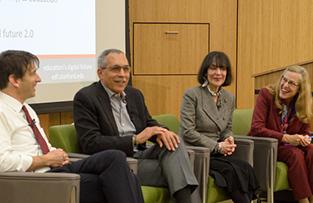
Simple psychological interventions can have big impact on student success
Helping teachers understand how students experience a classroom and giving them the tools to change behaviors are just some of the ways social psychology research is having a big impact on improving educational outcomes.
Leading social psychology researchers from Stanford gathered recently for a panel discussion at the Graduate School of Education, where they urged continued cooperation by scholars and practitioners in the fields of education and psychology.
“Psychology matters,” said Claude Steele, dean of the GSE and professor emeritus of psychology. “This perspective needs to be lifted up and put into play with dominant discourse in education.”
The panel, which also included Professors Carol Dweck and Geoffrey Cohen, focused on how issues surrounding stereotypes, sense of self and motivation influence learning.
“Having American teachers understand how much there is to learn about the things we're talking about is a critical first step in a new era of approach here,” Steele said.
Added Cohen, a professor of psychology and education: “It'd be great to see more partnerships, as is going on here, between educators and education researchers and social psychologists. My sense is that this perspective on education and motivation is not out there as much as it could or should be.”
The discussion on Feb. 18 was co-sponsored by two GSE initiatives: Education’s Digital Future and the Workshop on Poverty, Inequality and Education. It attracted an overflow crowd, and also was broadcast online and through Twitter.
Professor Deborah Stipek, an expert on student achievement, school reform and early childhood education, moderated. Video of the presentation can be found here.
Modest Interventions, Major Gains
Panelists took turns during the 90-minute event presenting their scholarship, then answered questions from the audience.
Steele, whose research has focused on the psychological phenomenon known as stereotype threat, explained how debilitating it can be for students.
Stereotype threat, which is the worry people have when they risk confirming a negative stereotype about their group, "can deter you from taking a particular road in life because you don't want to live with that kind of pressure or discomfort," Steele said.
Hundreds of studies have found that stereotype threat prevents people from performing as well as they can.
Research also has shown that the way students are praised effects their achievement, as does a student's mindset.
Dweck, the Lewis and Virginia Eaton Professor of Psychology, has discovered through her research that students who believe their intelligence is a fixed trait do worse that those who believe their intelligence can be developed with good strategies and good instruction.
"When adults praise students for their intelligence it puts them in a fixed mindset and makes them vulnerable. They don't want to take on hard tasks and they don't stick to them," Dweck said. "But when adults give kids process praise, praising them for effort or strategy or focus, for perseverance or improvement, it gives them more of a growth mindset. It says that skills are developed through engaging in these processes. These kids then take on difficult tasks and stick to them."
Disparities in learning and motivation can also result from a sense of not belonging, said Cohen, the James G. March Professor of Organizational Studies in Education and Business. He pointed out that students operating under negative stereotypes, insecurity or self-doubt experience the same classroom very differently.
This, he said, is important to keep in mind so that when "we see a chronically underperforming or misbehaving student we don't jump to the conclusion that it's something in the kid but instead understand that it can be something in their experience of the classroom that repeatedly occurs."
Dweck and Cohen outlined remedies they've tested in classrooms to boost performance and help close achievement gaps.
These interventions can often be remarkably simple in nature, the scholars said, and include practices such as adding a few minutes to a lesson plan for affirmation of values or to offer praise for the effort students are taking. Helping kids find the common ground they have with their peers rather than only focus on their differences is another strategy.
"It's been shown that timely interventions aimed at key psychological processes can in the right time, the right place, have effects that are not only large by intuitive standpoints but that also persist over surprisingly long periods of time," Cohen said.
But there are caveats, the scholars noted.
Bringing interventions to classrooms and schools on a large scale has proven difficult.
"We have to treat this scientifically and learn the moderation," Steele said. "We know some of these things work well when there's a good foundation of schooling underneath but what about when there isn't?"
Cohen said structural reform in schools and reducing bias and prejudice are essential components to allow interventions to succeed. "It's in partnership with those approaches that the psychological interventions can be one other piece of the puzzle."
Stipek, the Judy Koch Professor in Education, also noted research has shown that it's difficult to dislodge certain beliefs teachers might have about students and even giving them the tools to deal with specific behavior won't work if their fundamental belief system isn't first changed.
To get it right, the scholars said, patience is key.
"We have a great sense of urgency. We're haunted by these achievement gaps. We're haunted by these growing inequalities in performance," Steele said. "They threaten the fabric of our society, and we want to make progress in a hurry. Rightfully, we're looking for good avenues to go down. I think the argument here, though, is to have the patience to go down the roads carefully."
Stipek, the incoming GSE dean, challenged the social psychologists to "keep plugging away and getting those details right so we know how to help teachers be as good as they can be."
___
Lauren Scranton, a master's candidate in the POLS program at the GSE, is an intern in the school's communications office.



